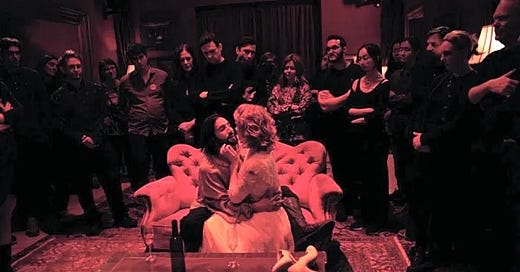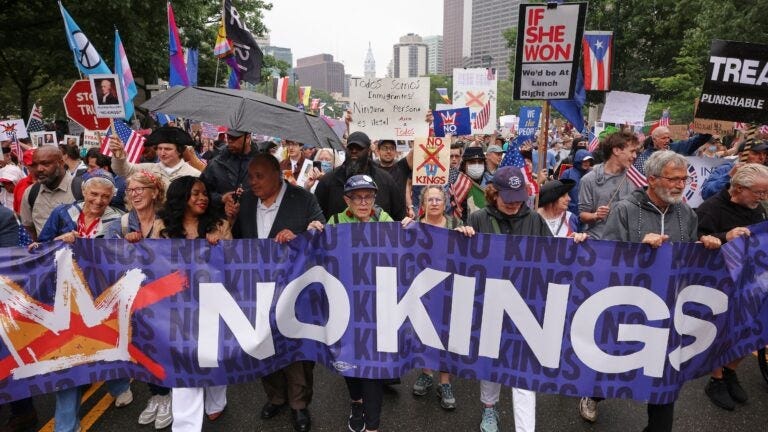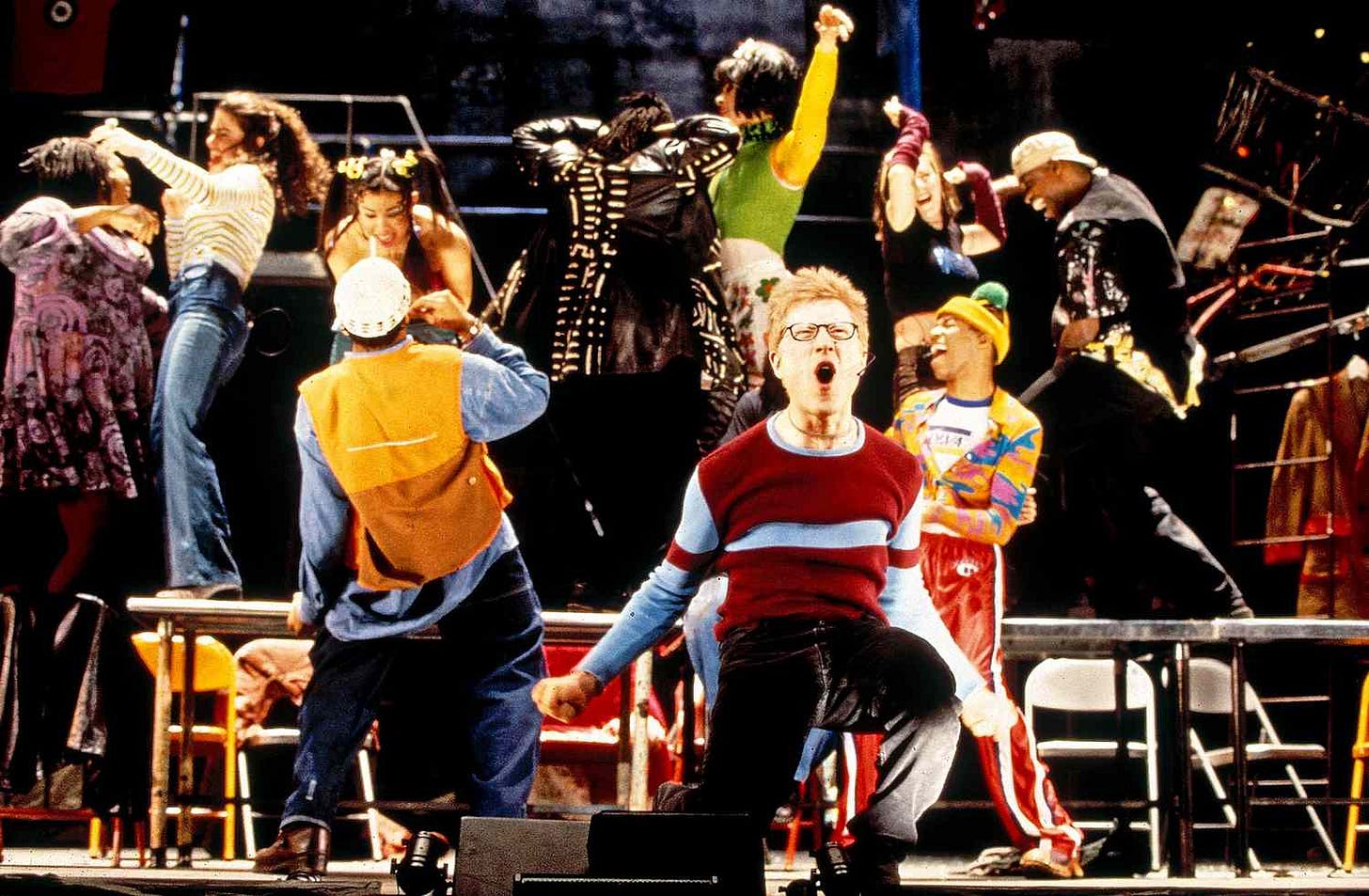Playing at Revolution as the Protests Thunder
What role can immersive theater play in showing us exactly how and why people rise up?
Jake Ryan Lozano and Zina Zinchenko in the 2025 NYC production of THE DEATH OF RASPUTIN - Photo by Maria Baranova
While people in all 50 states protest Donald Trump’s military parade, and Israel bombs Iran, I watch a character in an immersive performance of Death of Rasputin decide to plant an explosive at the palace of the Tsar in 1916 Russia during the last days of the Romanov Dynasty. I had been following this one character, cabaret singer and burgeoning revolutionary Katya, for most of the show.
There were only about 8 of us in the room with Katya because we had chosen to stay with her when more dramatic action had pulled the rest of the audience away. It was almost all women who stayed. Katya, drunk on vodka, brought us into her bedroom after a wrenching, tearful monologue about losing her brother to the army. In the bedroom, we became her confidantes and co-conspirators as she mixed together the elements for a homemade explosive and then handed the bomb to one of the audience members. I don’t want to give away any of the other plot points, but this scene in particular felt incredibly potent. I left the show still thinking about it, and it remains today as I sat down to write.
What would drive me to violence on behalf of my cause and my people? Is a violent act the only way to force systemic change?
I didn’t realize this until right now, the morning after Death of Rasputin as I’m writing this article, that my favorite pieces of theater, since I was old enough to care, have been about characters in times of revolution, making hard, bold choices to stand up against corrupted power.
The very first musical I became obsessed with was Hair, when I was 12 years old. I didn’t understand most of the references of the show (we didn’t have Google so I could just look up the meaning of ‘sodomy’), but I could feel the joyful defiance in the title song, a stance against cutting one’s hair for the military. (Later, CSNY’s “Almost Cut My Hair” gave me a similar thrill).
After years of Hair obsession, I entered a Rent era, feeling incredible kinship with a group of poor artists struggling staying true to their art, despite needing to make money, alongside the AIDS crisis. This kinship is especially remarkable given I was a middle class teenager living in a small town in eastern Washington state. I wanted the opportunity to stand on a table and yell, “No, I won’t be part of the system!” My favorite song in that show is called “What You Own,” a rallying cry against selling out and for choosing love, even when its hard.
I remember blaring this song, scream-singing while I sobbed in my Hyundai accent driving out of Beaverton, OR, when I quit my corporate consulting job at Nike in 2012 to go to grad school for playwriting.
In my third year of that graduate program I wrote my own exploration of revolution, a play called The Orange Garden, which is about a love story between an American peace corps volunteer and a college student involved in protests at the beginning of the Iranian revolution. I was again asking myself, “What would I die for?” “What sacrifices would I make?”
Theater is a powerful place to explode the microcosm of moments in the lives of humans that lead to a revolution. Political upheaval can be easily boiled down to names and dates, buildings destroyed and eras summed up in a few words like “The Land War” that end up blurring all of the individuals together in a wash of time.
What we forget is that big change is often the result of small actions and those small actions are usually incited by an accumulation of love, anger, desperation, and loss.
What immersive theater/gaming/VR does so well, that passive story experiences can’t, is put you, the audience member, in the room at the moment of great decision. It asks you, sometimes even directly: Given these circumstances, what would you do?
My long-time friend Matthew came with me to Death of Rasputin and then, afterwards, he took me to the building in Chelsea where Sleep No More ran for 13 years. Matthew is working with the owner of the building to strategize what might be next for its life. We walked through the empty maze of hallways and rooms, feeling ghosts everywhere.
Sleep No More was my first experience of large-scale, free-roam immersive theater. It terrified me in a way that made me feel fully alive— not knowing what would happen and feeling my choices might lead me to something dangerous. It made me want to create theater that lived between fear and excitement and turned on the audience in a full-body experience. But the audience experience of Sleep No More, wandering voyeurs in masks, is generally a passive one. You are meant to watch from a distance, from the safety of your anonymity.
The world of 2011—when Sleep No More opened—and the world of 2025 are quite different, and I think immersive experiences have the opportunity to inspire audiences to be less passive voyeurs and instead invite them into active engagement in new ways. (I wrote about this in relation to Life and Trust, the short-lived offering from Sleep No More producers, Emursive. My critique of the show was not well-received by the producers who posted a scathing, now-deleted comment, but I stand by my criticism: it’s time to move beyond masks).
Death of Rasputin does not use masks. It asks audience members to dress in black and to not speak, both of which serve to set the tone and ensure minimal disruption to the performance. But being able to make meaningful eye contact with the performers and with the other audience members really matters here. We are together in this.
We are together in this. And yet the divisions are palpable. Us versus them. Will that ever change? Those in power driven by greed and lust for control and unhealed trauma playing out their machinations on the people they cannot see below their marching feet?
Three days ago, Donald Trump went to see his favorite musical at the Kennedy Center, Les Miserables. That was my favorite, too, for a brief moment subverting Rent as number one during my junior year in high school. I wonder what Donald Trump loves about it, what he connects to? Does he realize it is a story about revolution, this one the Paris Uprising of 1932 against the monarchy? Maybe Trump is too literal to see the parallel. After all, the United States is not a monarchy; yet beneath that revolution, and so many revolutions, is outrage at a gross inequity between the rich and the poor. Can Trump not see that same parallel today?
Perhaps to him, it’s just a story, something to watch passively in the red-walled theater and to forget once back home in his palace.
This is where immersive experiences offers something traditional theater cannot: the felt experience of a character’s life and choices. The demand: do not look away. We are here together.
Les Miserables, like Rent and Hair impacted me as a young human and artist. And I can only assume it did the same to many others. And I hope Death of Rasputin will have the same far-reaching impact. These snapshots of humans in revolution show us that change is possible, change is worth fighting for, and change can and will happen at the scale of the human heart. Small, small, and then overwhelmingly large.







